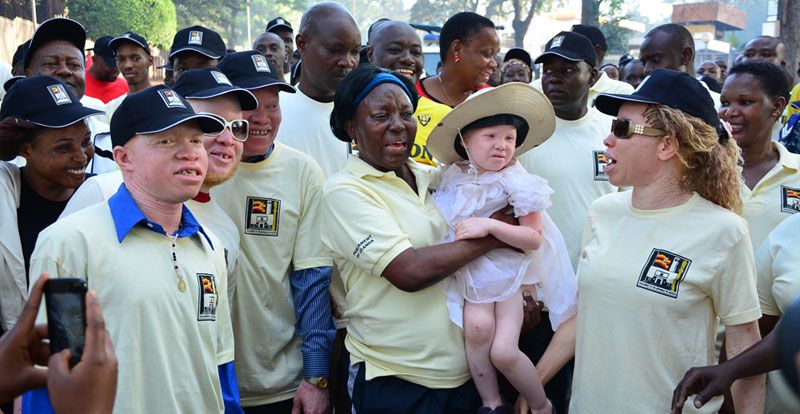
There would be no Parliament if there were no people. Put differently, Parliament exists to serve the aspirations of the people.
In this special edition of Parliament and You, we pick on just a few of the activities that the 10th Parliament has been involved in with the aim of strengthening its relationship with the public.
A strong relationship between Parliament and the public, needless to say, is the surest guarantee of a blossoming democracy. After electing representatives to Parliament, the public is required to keep playing an active civic role to ensure that the representatives perform individually and collectively.
I therefore comment to you this special edition of Parliament and You. By the time you are through with it, I trust that your understanding of Parliament’s relentless efforts to serve the aspirations of the public will be clearer to you. Enjoy the reading.
Origins of Parliament
Whichever society one may think of, there was always a semblance of what can be equated to the modern parliament. Because human beings are endowed with language, they have always used this endowment to discuss whatever affects them
From the earliest times for which records are available, African societies had what have been collectively called councils of elders, in which respected members of society (exclusively men) would discuss the affairs of society.
In the Middle Ages Europe, particularly Britain, kings would often consult their barons before making important decisions. The barons, it has been reported, were usually called upon to appear before the king during religious festivals (Christmas, Easter, Witsun).
Before the coming of colonialists, the different societies that were eventually lumped together to form Uganda had equivalents of parliament. For example, there was Lukiiko in Buganda and Busoga; Orukurato in Tooro; and Ishenjero in Ankole.
As the British prepared to hand over independence to Uganda in the late 1950s, they conducted elections to what was called the Legislative Council (Legico) and later parliamentary elections in 1961 and 1962 when the country got independence.
Uganda’s politics was then disrupted by the 1966 attack on KabakaMutesa’s palace in Mengo and the subsequent forceful takeover of power by then prime minister Milton Obote, who was in 1971 deposed by then army commander Idi Amin. Parliament would only resume in 1980 after Amin had been overthrown in 1979.
When President Museveni took over government in 1986 after parliament had again been disrupted when the military junta of the Okello brothers had overthrown Obote II in 1985, parliamentary practice was restored first throw the National Resistance Council (NRC) composed of leaders of the National Resistance Army and the National Resistance Movement, its political wing. NRC was in 1989 expanded with some indirectly elected members until a directly elected parliament came into force in 1996, a practice that has continued consistently through 2001, 2006, 2011 and 2016.
Before the parliamentary elections of 1996, Uganda had written a new constitution in 1995, which Constitution provided for the election and functioning of Parliament.
The Constitution empowers Parliament “to make laws on any matter for the peace, order, development and good governance of Uganda”, and “to protect the Constitution and promote democratic governance in Uganda”. In whatever Parliament does, it is supposed to take into account the needs and aspirations of the people of Uganda.
Parliament Week: When Parliament opened its doors to the public
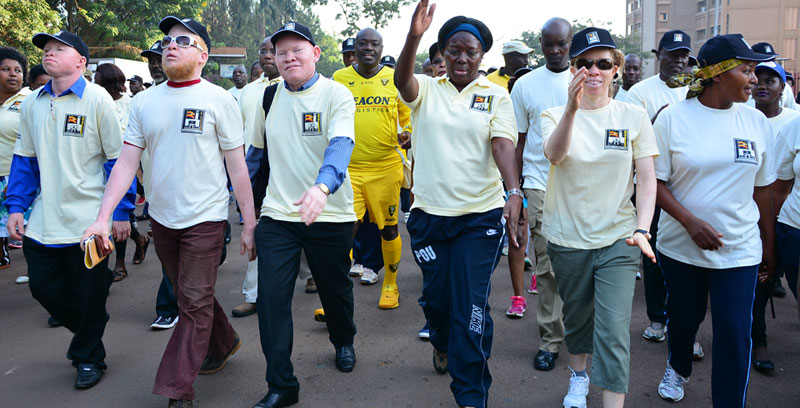
Starting Sunday 5, 2017, the 10th Parliament opened its doors to the public for a whole week.
The Parliament Week,as it was called, was organised by theParliamentary Commission and included a series of activities that ran along the theme: “Engaging the public in a people-centered Parliament”. That was only the second time the Parliament of Uganda was engaging in such an event.
In the run-up to the Parliament Week, Speaker Rebecca Kadaga said during a press conference: “For a long time there has been a view that Members are far from the public, hence the Parliament Week where the public will access the institution and also interact with their members.”
She branded the close association between Parliament and the public during the Week as the “flagship of the 10th Parliament”.
During the week, which was kicked off with a walk that involved the Speaker, other Members of Parliament and persons with albinism, Speaker Kadaga announced that Parliament would work to establish a centre for the albino community, who are vulnerable and stigmatized.
During the walk Shs 40m was raised to support the construction of a one-stop community centre for the albino community in Uganda
“They find it difficult to study, find work and access information,” Ms Kadaga said of people with albinism.“We want to highlight their plight and have them in the mainstream for planning purposes.”
The envisaged centre is expected to have a hostel, health and training facilities and is projected to cost Shs 5b.
Parliament has already approved the scrapping of taxes on skin protection creams used by persons with albinism as a first step to enhancing the quality of life of people living with albinism.
To ensure total integration of persons with albinism in Ugandan society, Speaker Kadaga said there will be a deliberate effort to recruit some of them into the parliamentary service. Ms Kadaga said: “Let us encourage albinos to apply for our jobs in the Parliamentary Service by highlighting it in our job adverts.”
Several activities were carried out during the Parliament Week including an ecumenical thanksgiving, tour of the Parliament building and a meet-your-MP session. The week climaxed with members of the public choosing their own Speaker and holding a mock session in the Chambers of the House on February 10, 2017.
Deputy Speaker tips public on engaging Parliament
Parliament exists to serve the people, but it is important that the public engages Parliament to ensure that the core role of the institution is fulfilled and the people’s needs are duly served.
This point was powerfully made by Deputy Speaker Jacob Oulanyahwhen he spoke as the main discussant in a an engagement with members of the civil society under the theme ‘Role of the public in building a strong people-centred Parliament’. This was during the Parliament Week on Tuesday, February 7, 2017.
Mr Oulanyah said as matters stand, there seems to be a gap between Parliament and the public, which he said needs to be closed. And this, he said, can only be attained by public working closely with Parliament in executing its roles.
The Deputy Speaker gave an example of how the public can be more engaged: “There exists a provision for the public to participate in public hearings when Bills are being discussed at the Committee stages. This is something that the civil society and the general public need to embrace because the public hearings were created for them.”
He added that there are also Private Bills that are not common in Uganda, but which are originated by a private entity which in this case could be the public.
“Private Bills are an opportunity for you, the public to initiate a law. You can also present petitions on important matters to either my Office or the Office of the Speaker or even through your area MP,” Mr Oulanyah said. “I have never received a private bill in my entire time at Parliament; this goes to show that the public has not really done its part.”
The Deputy Speaker also urged the public, especially opinion leaders, to create a working relationship with Parliament.
“For people who have an opportunity to speak in the media, please avoid making statements about Parliament’s image that are misleading,” he said. “We should partner and work together since this is your Parliament.”
Mr Daniel Wandera Ogalo, a former Member of the East African Legislative Assembly, agree. He said: “It is about time that the public engaged Parliament through the various forums that have been mentioned by the Deputy Speaker.”
Parliament opens up vetting public officials to the public
When the President appoints officials to public offices, Parliament is in many cases required to vet the appointees to ensure that they are fit to serve in the respective public offices. Some of the offices for which Parliament vets appointees are ministers, judges, head of police, and commissioners to the Electoral Commission, among many others.
The vetting has been a closed affair done by Appointments Committee of Parliament chaired by the Speaker. But this is about to change.
Speaker Rebecca Kadaga said at the opening of the new Law Year 2017 at the High Court in Kampala on Monday January 30, 2017, that the Committee on Rules,Privileges and Discipline had amended its rules to open up the vetting process of judicial and other senior public officers to the general public.
“This decision is going to save me from keeping confidential details of incompetent people; and of those with fraudulent papers, who have been nominated to occupy public offices,” Ms Kadaga said.
Kadaga said that the Appointments Committee had been under pressure from the public to know how these appointments were conducted.She said she welcomed the idea.
This move is expected to get the members of the public more interested in the workings of Parliament and further build up public trust in the institution.
Parliament connects to the public through receiving petitions
One creative way that the Parliament of Uganda devised to keep in close touch with the people is through accepting petitions from any aggrieved members of society.
Whereas every Ugandan will have a representative in Parliament through whom they can channel their grievances – and the representatives are usually more than one because there are also Woman MPs – any member of the public can still directly petition Parliament through the Speaker if that member of the public feels that is the most efficient way to raise their issue.
Petitioning Parliament by a member of the public may be done with or without the consent and support of the area Members of Parliament. The idea is that no problem should grow out of hand and people suffer irreparable injury without Parliament doing something about it in cases where it can intervene.
On MondayJanuary 30, 2017, for instance, Members of Kinkizi Tea Operators Association delivered to the Speaker of Parliament a petition over what they called discrimination and irregular payments for tea seedlings by the Kinkizi Development Company (KDC).
Presenting the petition, Mr Godfrey Tumwebaze, the chairman Kinkizi Tea Operators Association, asked Parliament to intervene and save the Association from exploitation. Mr Tumwebaze said that KDC has since 2012 failed to pay some farmers for seedlings they supplied.
“We have been supplying seedlings to other farmers and we are paid by government at an agreed price per seedling, but we have not received payment for the last five years,” Mr Tumwebaze told the Speaker.
This is just an example. Almost every single week, the Speaker receives a petition from members of society who are aggrieved about one issue or another. Sometimes the petitions are even more.
On receiving the petitions, the Speaker determines how to handle the issue at hand or may advise the petitioners how else to approach the matter. Depending on the complexity and urgency of the matter, the Speaker may assign a specific Committee of Parliament to investigate the matter, which may even end up visiting the site and taking other measures.
The Committee may then report back to the whole House which then determines what to do next.
In doing all this, Parliament is guided by the need to solve the problems that afflict citizens, and the big volume of petitions received by Parliament is an important mark of public trust in the institution.
Parliament supports Uganda Cranes
The national men’s football team, the Uganda Cranes, made the country proud when they participated in the African Cup of Nations tournament finals that were held in Gabon. This was the first time the Cranes were participated in the finals of this tournament since 1978.
Recognising the capacity of sports (and football in particular) to unify people, promote physical fitness and act as a source of revenue for so many people, the 10th Parliament stepped in to support the Cranes and promised to do more in the future.
Parliament spared time to debate and recognise the achievement of the Cranes in qualifying for the continental tournament and was particularly enthused that the Cranes and Denis Onyango, the team captain, had been voted African National Team of the Year and African Player of the Year, respectively, in 2016 at the Confederation of Africa Football Awards held on January 5, 2017 in Abuja, Nigeria.
During the session, Speaker Rebecca Kadaga said of the achievement: “This is a milestone that we ought to recognise as a nation. It is a big deal that our goalkeeper is the 10th best goalkeeper in the world and the best in Africa.” Onyango plays professional football in South Africa.
In recognition of the contribution by the players, Members of Parliament during the session pledged Shs 500,000 each as a token of appreciation and support to the Cranes asthey prepared to participate in the Africa Cup of Nations 2017 tournament in Gabon.
Speaker Kadaga eventually visited the team in Gabon during the tournament and delivered the cheque from the Members of Parliament.
Speaking to the team before they played against Egypt in the tournament, the Speaker said: “I am one of the people who got so hurt when our team lost in the Nations Cup in 1978.You are the gallant players that have restored the hope of millions of people back home. You have all our support and I will be in the stands to cheer you on.”
The Cranes lost to Egypt by a lone goal and exited the tournament because they had lost to Ghana in the opening game by the same margin. They eventually scored their only goal of the tournament in a draw with Mali in their final group game to salvage some pride. The team fought hard during the tournament, but a combination of inexperience at that level, given that all the players were playing there for the first time, and the fact that they were drawn against the powerhouses of African football, condemned them to an early exit.
The 10th Parliament urged the government to allocate more money to sports and pledged to pass the budget once it is presented.
Speaker roots for better health services for islands people
It is hard to access medical attention when a poor Ugandan falls sick because of poverty and scarcity of cost-free medical services to those who cannot afford to pay for it. It is perhaps even harder for people on the islands.
This is why Speaker Rebecca Kadaga, during a visit to the island district of Kalangala, urged the government has not to phase out Health Centre IIs particularly on the islands in order to cater for the the people there.
She said whereas the Ministry of Health plans to phase out Health Centres IIs and replace them with Health Centre IIIs, there is need for serious consideration of this proposal especially since it may be hard to spread Health Centre IIIs to all the islands.
The Speaker, who is a keen enthusiast for health service provision in general and maternal health in particular, was officiating at a handover of medical equipment to Kalangala Health Centre IV at a function held at the district headquarters on Saturday, January 28, 2017.
The Speaker was reacting to the cry of Mr Willy Lugoloobi, the chairperson Kalangala District, that there was a dire need for providing more health care facilities for the island district.
The equipment, Ms Kadaga said, was part of a donation sourced from Medi-Share in the US in a process that started in 2013.
She said Parliament takes particular interest in people’s health and will always do whatever it can to improve it.
Speaker rallies district speakers on education
One thing any country that seeks to prosper must take seriously is education. Children must acquire the knowledge and skills that they require to effectively participate in the transformation of their society, failing which that particular society will lag behind in terms of development.
This is the reason the 10th Parliament is very interested in the education of Uganda’s children, an interest Speaker of Parliament Rebecca Kadagabrought out powerfully while officiating at the opening of the Annual General Meeting of the Uganda District Council Speakers Association on Wednesday January 25, 2016, in Mukono town.
“Primary Schools performance has been deteriorating especially in certain districts and this is something that we need to combat,’ the Speaker said. “During the tenure of your work you need to emphasize the responsibility of parents to ensure that their children go to school and are well fed. Give priority to education generally.”
Ms Kadaga said there was a growing tendency of people producing children and leaving the responsibility of looking after them to the government which should be combated.
For the Speaker to gain a better understanding of the problems at the grassroots level that can then be fed into the business at Parliament, Ms Kadaga promised to arrange a two-hour meeting in February with all district Speakers.







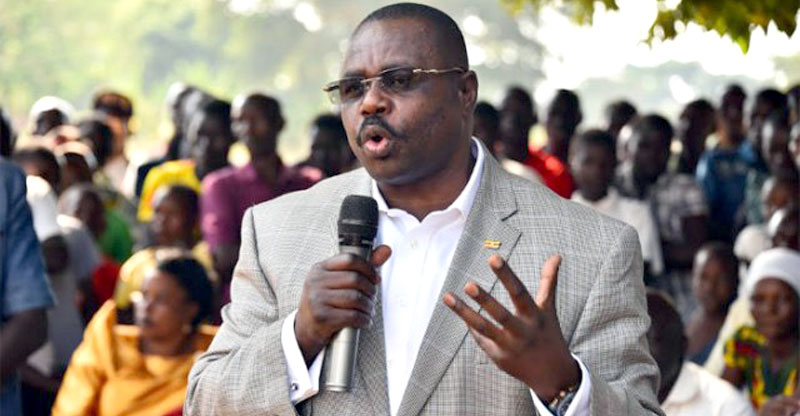
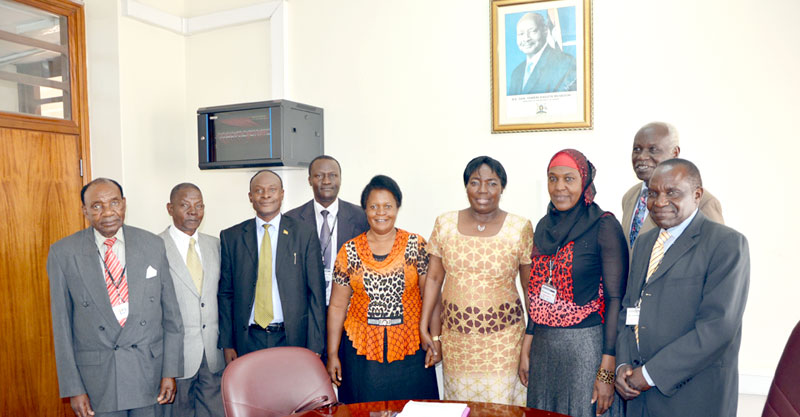
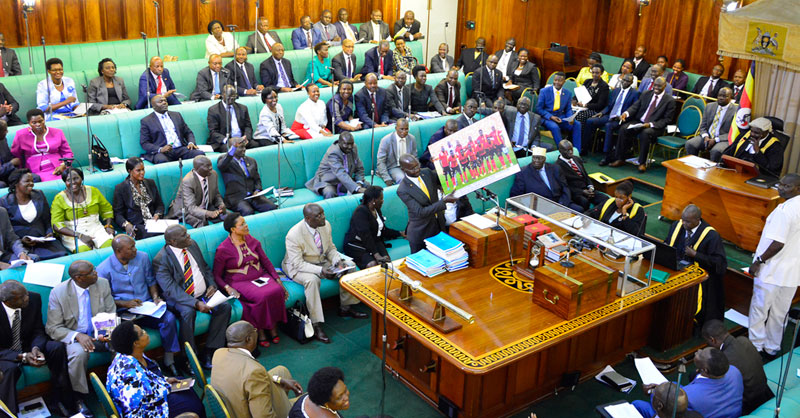
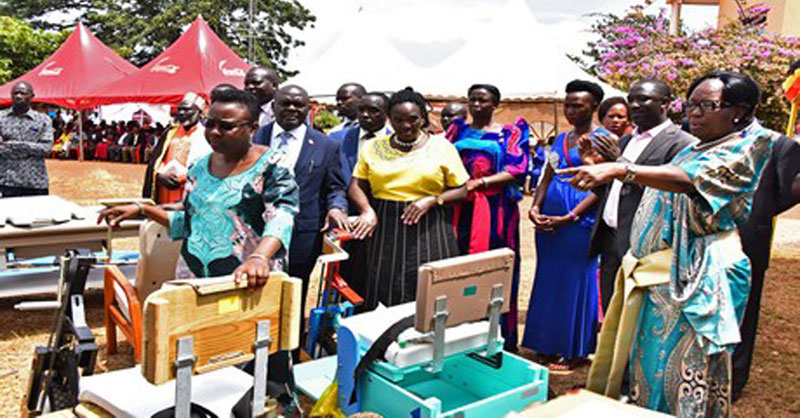








Sunrise reporter
Leave a Comment
Your email address will not be published.